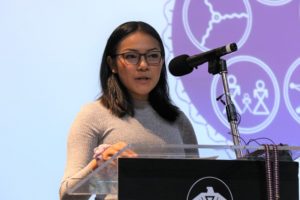Leave good footprints
Anishinabek Nation Chief Water Commissioner, Autumn Peltier, spoke on day one of the Anishinabek Nation Eshekenijig and Getzidjig Governance Gathering on July 31, 2019 in Sault Ste. Marie. The following is exerted from what she shared with the some 100 participants.

What does governance mean to me? When I hear this, I think of what does being Anishinaabe mean to me? The term Governance is a word that would have been foreign to our people. The dictionary says governance means “the action or manner of governing”. Meaning, the ones in leadership has a way to sway or control things. What I have been learning, as Anishinaabe people, we had our own form of government and ways to help our people.
Everyone had a voice, the Elders, even the ones who were ill and couldn’t attend a meeting, someone would go sit with them, or a leader would make sure they heard from everyone, so everyone has a voice. We can’t forget to listen to the children, listen to the mothers and listen to the ones who are too shy to come out and share. Leave no one behind.
Our people were guided not by one another, but they listened to the land. The land is our government. The animals we depend on our government. The water is our government. Without any of these, we wouldn’t be here today. Our people’s role as Anishinaabe people is to protect this land and be caretakers. We learned and were instructed to care for this land. Our creation story is our government.
Also looking after each other and ourselves is also a big part of who we are. I was told that you can only help someone as far as you have helped yourself. This is more teaching passed down orally from Aunties and Uncles. We need to be healthy and use our medicines and our ways and hold onto that. We need ot keep those traditions and teachings alive.
Our ancestors fought so hard to keep our languages, our ways of life and oral teachings alive. They saw ahead and they suffered for us. I often think that one of my great, great-grandparents prayed for me. They prayed for our way of life and our future. Someone prayed for you and you are someone’s Seventh Generation.
The water is a precious resource that sustains all life. I have been hearing all over that we only have 12 years left because of the impacts of climate change. Then I hear we have 20 years left if we don’t do anything now. I think of what kind of future do we even have? In 12 years I will only be 26. Or in 20 years I will be 34. That’s not much of a futuer. I had no idea a few years ago I would even be here doing this work. But I often think of those who helped me be here.
My inspiration for this work is no longer here and she passed away doing this work. Her last words to me were to not stop loving the water and to keep doing the work. She was 77 when she passed away. I hope I am not still standing here trying to advocate for clean water when I’m 77.
I recently visited Attawapiskat. Our people in the north are living in Third World conditions. Those children live in a world where a bottle of water is $18 and for us here a bottle is $2-$3.
I still can’t imagine living that way. In the south we are so fortunate to be able to drink from our taps, and our water is fresh and clean.
There are so many things to worry about, when we should just be kids. I am also fortunate not to have to worry about accessing resources and not being isolated. My heart and prayers are with those ones in Attawapiskat and in our northern communities.
As young people, we are inheriting this land, these communities and this is our future. So like Quinn Meawasige said the words he remembered our grandmother Mary Elliot say: Leave good footprints.

